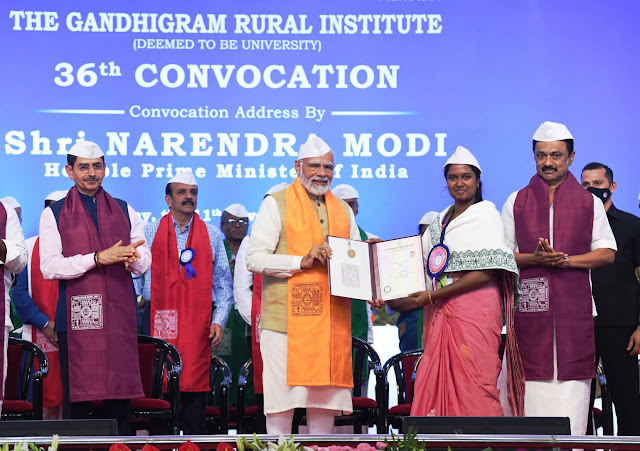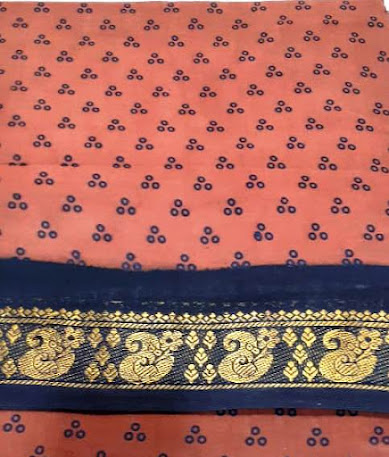It was a great day. Our Hon’ble Prime Minister, Shri Narendra Modiji attended the 36th Convocation Ceremony of Gandhigram Rural Institute at Dindigul in Tamil Nadu - and handed over degrees in the convocation ceremony. This was followed by the Prime Minister awarding gold medals to the winners and honoris causa to the deserving candidates. Sri Umayalpuram Sivaraman and Maestro Sri Illayaraja were conferred honorary doctorate. For sure, you would have observed that all dignitaries wore Gandhian caps !!
I had posted on Mridangam exponent Sri Sivaraman and wrote some basic news on the Gandhigram Rural Institute that it was founded by two dedicated disciples and contemporaries of Mahatma Gandhi, Dr.G. Ramachandran and Dr.T.S. Soundaram Ramachandran - a day later, digging deep, there are so many interesting aspects that went sort of unnoticed.
Those wearing sarees for sure would have had many in their collection – the Chinnalapatti sarees .. .. there are “Sungudi saree”, Madhurai Saree and Chinnalapattu. Sungudi sarees are traditional cotton sarees from Chinnalapatti village, Tamil Nadu, defined by block print and tie & dye patterns.
Nai Talim, or Basic Education, is a principle which states that knowledge and work are not separate. Mahatma Gandhi promoted an educational curriculum with the same name based on this pedagogical principle. It can be translated with the phrase 'Basic Education for all'. It was conceptualized out of Gandhi's experience with the English educational system and with colonialism in general. character of education, its social character and its form as a holistic process. For Gandhi, education is 'the moral development of the person', a process that is by definition 'lifelong'. Gandhigram Rural Institute (GRI), was founded by two dedicated disciples and contemporaries of Mahatma Gandhi, Dr.G. Ramachandran and Dr.T.S. Soundaram Ramachandran, had its foundation Mahatma Gandhi’s revolutionary philosophy of Nai Talim.
Here is
something on the village and more on Dr TS Soundaram, about whom Tamil Nadu
must be proud of !! -
On Feb 2, 1946 the villagers of Chinnalappatti rioted near the railway lines to force the British authorities to stop a train heading for Madurai. On the train was Mahatma Gandhi and the villagers wanted to see him in close quarters !! Chinnalapatti's economy mainly depends on the handloom weaving industry and is known for it. Weaving has been a way of life in Chinalapatti for centuries - Workers produce cotton (Sungudi) saris with Zari borders, which are for daily wear.
The women behind GRI was married in 1917 when she was 12 to her cousin Dr Soundararajan but sadly was widowed in her teens. Not bound by tragedy, she went to study medicine at 32 at Lady Hardinge Medical College, Delhi, where she was deeply influenced by Gandhiji and she plunged into freedom movement. She played a pivotal role in Madurai Meenakshi temple movement too.
T. S. Soundaram
Ramachandran (18.8.1904 – 21.10.1984) was not simply a Physician .. .. she was
a social reformer. She was the daughter of T. V. Sundaram
Iyengar, founder of T V Sundaram Iyengar
and Sons Limited, popularly TVS Group of
companies, one of India's largest industrial conglomerates.
During her college days in Delhi, she met Sushila Nayyar and through her she met Gandhiji. She was immediately drawn to the freedom struggle, but she did not give up her studies. At relatively old age of 32, she graduated as Doctor in 1936. She was drawn to freedom struggle and became acquainted with G.Ramachandran, a keralite, who was active in the Harijan movement. They fell in love but under advice of Gandhi remained separated for one year and later were married in Nov 1940. They participated in Quit India Movement, but Gandhi thought she would serve India better by not getting involved in politics. He made her the representative in South India of the Kasturba Gandhi National Memorial Trust and entrusted her with setting up an institution in a rural area that would improve the lot of the poorest of the poor. So was born the idea of Gandhigram, where villagers were taught skills and provided support to revive village industries and the economy of the rural community. Dr.T.S.Soundaram pioneered wholeheartedly the scheme that focused on healthcare, education, economic development and social welfare in the rural communities in the surrounding area.
She was instrumental in setting up Gandhigram in 1947 where villagers were taught skills and provided support to revive village industries and the economy of the rural community. Today the Gandhigram Rural Institute near Dindigul has grown into a cluster of institutions for constructive programmes and still serving the deprived people. Making inroads into rural health and family welfare, she started a two-bed clinic from a thatched hut in Chinnalapatti, which has expanded into 230-bed Kasturba Hospital. Along with her husband, Dr. G. Ramachandran, she notably changed the way of life for those rural people.
Soundaram was elected Member of the Legislative Assembly (India) twice from then Madras State, first in 1952 from Athoor (State Assembly Constituency) and in 1957 from Vedasandur (State Assembly Constituency) representing Indian National Congress, then an MP in 1962 representing Dindigul (Lok Sabha constituency). With her move again to Delhi, she was appointed the Union Deputy Minister for Education. It was during her tenure as Deputy Minister that she introduced compulsory and free primary education throughout India. She also helped start the National Service Scheme (NSS), that still has a strong rural service element to it. In the year 1962 she was awarded Padma Bhushan for her contribution towards social work. Soundaram lost the 1967 general election from Dindigul (Lok Sabha constituency) to N. Anbuchezhian a young student leader of DMK with a margin of more than one lakh votes, subsequently she went back to social work and retired from politics.
Her husband - G. Ramachandhran (1904 – 1995) was a soldier for the Gandhian cause, social reformer and a teacher. Besides founding Gandhigram, he authored several books. Viswabharati, Rabindranath Tagore's University, in Santhiniketan awarded him the higher title "Desikottama" ('The Best teacher'). After severing various cadres before and after the Independence of India he returned to his native hometown Neyyattinkara, Kerala, and started his last venture "The Madhavimandiram Loka Seva Trust" for the welfare of women and children in 1980. During the year 1991 he started a public school at Neyyatinkara. He was an MP and Health and Education Minister in Pattom Thanu Pillai's Ministry in Kerala.
Govt. Madhavi Thankachi High School was established in 1950. It is in Ooruttukala on the outskirts of Neyyattinkara. The School under the Department of General Education, Government of Kerala is named after the mother of Dr. G. Ramachandran, - the land for the establishment of the school was donated by him.
Great people – who sacrificed their lives, fought British in the freedom struggle, later through social service changed the lives of rural people (but sadly forgotten and even defeated in elections !!)
12th Nov. 2022.




Good work done sampath. Bringing light upon the unknown and hidden information is appreciably noteworthy. Remarkable info.
ReplyDeleteYes. Very remarkable informations...
ReplyDelete